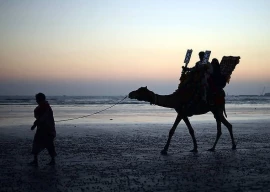
Scheduled Caste Hindus including Meghwals, Odhs, Valmikis, Kohlis and Bheels, are the largest among the religious minorities with 47.7 per cent of the population of all minorities but are the most deprived communities and feel that their population does not reflect in their representation in parliament, government services and education. Majority of them lives in inhuman conditions and work as bonded labourers, agriculture and sanitary workers.
According to a Scheduled Caste Hindu leader, the current system denies them proper representation in national and provincial assemblies. The minority representatives in assemblies are mostly upper caste Hindus or Christians who do not represent them.
According to a recent report of the Election Commission of Pakistan, there are 2.77 million registered minority voters including 1.25 million Scheduled Caste Hindus besides 150,000 upper caste Hindus, 123,000 Christians, 115,966 Ahmadis, 5,934 Sikhs, 3,650 Zoroastrians, 1,452 Buddhists and 809 Jews.
Scheduled Caste Rights Movement Pakistan Chairman (SCRM) Ramesh Jaipal while talking to The Express Tribune said that in 98 constituencies of the National Assembly, minorities have over 10,000 voters in each constituency and in 191 constituencies of provincial assemblies, they have 5,000 voters in each constituency — the “decisive voters” — as a candidate normally wins with a margin of 5,000 or 10,000 votes.
He said that there should be demarcation of constituencies for minorities so that they could elect their representatives. He also said that the position of a minority MNA should be devolved to the provincial level and that of the MPA to the division level. “In this way, all the minorities will get a fair chance to elect their representatives,” he said.
“At present, all minority representatives are from Sindh and are mostly Christians and upper caste Hindus, who do not represent the Scheduled Castes as they do not even like to mix up with the lower castes”.
While giving details about the number of registered scheduled castes Hindu voters in Punjab and Sindh, he said that there are 60,000 registered voters in six NA constituencies of district Rahim Yar Khan, 28,500 in five NA constituencies of Bahawalpur, 10,500 in four constituencies of Bahawalnagar, 18,500 in six NA constituencies of Multan, 4,000 in two constituencies of Lodhran, 31,500 in four constituencies of Khanewal, 14,500 of four constituencies in Vehari, 2,000 in two constituencies of Rajanpur, 9,000 in two constituencies of Layyah and 10,000 in five constituencies of Muzaffargarh.
In Sindh, there are 358,500 registered voters in three constituencies of Mirpur Khas and Umerkot, 211,500 in three constituencies of Tando Muhammad Khan, 188,500 in two constituencies of Tharparkar, 173,000 in three constituencies of Sanghar, 76,000 in one constituency of Tando Allahyar, 49,000 in three constituencies of Hyderabad, 38,500 in two constituencies of Ghotki, 26,000 in three constituencies of Khairpur-Meerus, 36,500 in one constituency of Matiari, 20,000 in two constituencies of Sukkur and 18,000 in one constituency of Jamshoro, he said.
Jaipal said that at least 18 seats should be allocated to the minorities in the National Assembly according to their present population.
Bhayya Ram Anjum, a former ticket-holder of the Pakistan People’s Party, talked about discrimination against minorities in the Constitution, saying Quaid-i-Azam had clearly stated that the State has nothing to do with religious identities and every Pakistani is equal.
“There is discrimination in the Constitution which does not treat minorities equally,” he said arguing that a person from the minority group cannot become prime minister or president. “Are we not loyal to Pakistan and why do they doubt our loyalty,” he asked.
He said that there are 33 per cent reserved seats for women in the parliament but women from minorities were not nominated according to their population ratio.
Muslim-Christian Unity Forum Chairman Samuel Yaqub said that political parties should select those minority candidates who were their true representatives.
“I have filed an application with the ECP demanding to inquire from the minority representatives sitting in the assemblies to tell us if they have utilised the funds allocated for minorities,” he said adding that the reserved seats were being allotted to the moneyed people.
Pakistan Muslim League-Nawaz member National Assembly Isphanyar M Bhandara said that it was imperative to conduct a fresh census to ascertain the exact number of minority population before thrashing out a strategy for their representation in the legislature.
Jamiatul Ulema-i-Islam-Fazlur Rehman (JUI-F) MNA Aasiya Nasir said that they were not demanding separate electorate but a mechanism should be evolved for the dual voting right.
She said that there was a need to increase the number of seats for minorities. She regretted that no minority representative was invited while making constitutional changes under the 18th amendment. “Now there is no minority member in the electoral reforms committee,” she said.
Published in The Express Tribune, October 13th, 2014.
COMMENTS (1)
Comments are moderated and generally will be posted if they are on-topic and not abusive.
For more information, please see our Comments FAQ









































well done Mr Muzaffar Mukhtar...i am observing that you are constantly trying to highlight those important issues which need to be highlighted actually...our media is so much consumed in other non issues that such important issues are always ignored..............